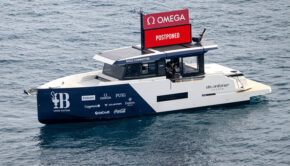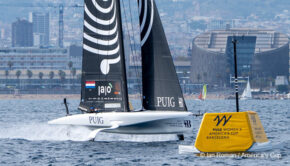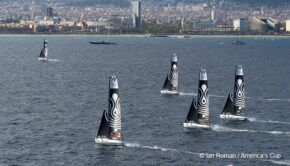Boat failure knocks Canada out of Women’s America’s Cup
Published on October 8th, 2024
The Women’s America’s Cup offered opportunity and risk for the twelve teams. While participating gave great exposure for the crew, the provided AC40 was no easy boat to sail, and with little practice time, problems could occur. That happened when incidents for the Canadian team derailed racing on day two. Here’s their update:
Barcelona, Spain (October 8, 2024) – Concord Pacific Racing’s campaign came to a heartbreaking end today after the Canadian team was forced to retire from racing following a catastrophic mechanical failure during the second race of the day at the Puig Women’s America’s Cup.
With their points accumulated on a thrilling first day managing fifth, the Canadians needed a strong performance to secure a spot in the top three and advance to the semi-finals.
Blustery winds and challenging conditions set the stage for fast and furious racing, with Concord Pacific Racing starting their first race well, storming around the top gate in second place.
However, the team suffered a huge nosedive toward the bottom mark, plunging into the water at speeds of over 30 knots. The dramatic stop narrowly avoided a capsize. Although the crew were all safe, technical issues with the boat’s data screens forced the team to retire to prepare for the next race.
In the pre-start of the second race, the team suffered a catastrophic hydraulics failure, losing control of the system that operates the foils and almost capsizing. The damage was so extensive the regatta will use a different hull in the days ahead.
It was a cruel blow for a team that had poured their hearts and souls into training over the last six months and showed such promise on the racecourse.
Reflecting on the incident, Concord Pacific Racing captain Isabella Bertold said: “It was a really tough way for us to end the event. We had a first-rate start and were sailing well. An unfortunate mistake on a gybe exit set us back, but we reset, and the boat was working well.
“Then, in the pre-start, while prepping for a gybe entry, I hit board down as usual, and immediately I thought, ‘We’ve lost part of the boat.’ It felt like we might lose the entire foil. We lost all functions and went with gut instinct to avoid flipping at 40 knots. I’m really proud we safely put the boat down and called for assistance.
“A full technical failure beyond our control was tough to take. After all the work we’ve put in, watching the final races from the sidelines was hard. We were well-prepped for the day, and the conditions were probably some of our favorites as sailors. We wish we could have been out there racing and fighting to move up the leaderboard.”
Starboard trimmer Maura Dewey echoed Bertold’s thoughts: “I feel frustrated and a bit sad because, like all sailors, I want to leave it out there on the water. I want to race my hardest, and the results are what they are, so to have the day end not through our fault but through a mechanical failure is really frustrating—it feels like unfinished business.
“On the other hand, it’s been incredible to be part of such an amazing regatta and the first-ever event for women in sailing. I just hope there’s another chance to go out on an AC40 in the future because it was super fun. They’re incredible boats, and the racing is only going to get better as people get more time on the water.”
The team acknowledged that these are some of the fastest foiling monohulls in the world, with extremely complex systems, and such breakages are a part of competing at this elite level of sailing.
Coach Chris Nicholson praised the team’s dedication: “We haven’t achieved what we wanted at this event, but I’m so proud of this team. You can never fault their effort or dedication. They were still hard at it last night, trying to squeeze everything out of themselves to improve, and that’s been their attitude throughout.
“It’s a difficult way to end a campaign due to mechanical failure, but I’m incredibly impressed with how they handled the situation on the water in such challenging conditions.”
While the disappointment will undoubtedly linger after today’s challenging end to the inaugural Puig Women’s America’s Cup, one thing is certain: this team has inspired the next generation of Canadian sailors.
Bertold said: “We need to take a step back and remember how significant this event is and a lot of credit needs to go to the organizers for putting on an incredible spectacle. If I’m an 18-year-old girl sailing in Canada right now, to have the choice between Olympic sailing, SailGP, America’s Cup, or AC40s is super exciting. The hard work we’ve done—and what those before us have done—is paying off, and I’m really excited to see what comes next.”
Dewey offered parting words of advice for young sailors: “For other girls sailing in Canada, I would just say take every opportunity that comes your way. There’s a lot of incredible stuff happening now for women in sailing, and it’s only going to grow. Say yes as much as you can, try lots of different boats, and see what happens. For me, it’s been about taking every opportunity I get with both hands, and it’s been really incredible.”
Meanwhile, Artemis Swedish Challenge put on a dominant display, winning all four of today’s fleet races and finishing at the top of the leaderboard. They were followed by Jajo Team DutchSail in second and Sail Team BCN, who secured the third and final semi-final spot.
Editor’s note: Canada was DNF-DNS-DNS-DNS today. For the daily report, click here.
Format: Twelve teams are split into two groups of six for an initial fleet race series in the AC40s. The top three teams from each side after eight races will race together in four fleet races to decide the top-two crews and from there it’s a one-race, winner-takes-all for the title.
Viewing details – Race information – Results – Weather forecast
Following the publication of the AC37 Protocol and AC75 Class Rule on November 17, 2021, the AC75 Class Rule and AC Technical Regulations were finalized on March 17, 2022. The entry period was from December 1, 2021 until July 31, 2022, but late entries for the 37th America’s Cup could be accepted until May 31, 2023. The Defender was to announce the Match Venue on September 17, 2021 but postponed the reveal, finally confirming Barcelona on March 30, 2022. The 37th America’s Cup begins October 12, 2024.
Teams revealed to challenge defender Emirates Team New Zealand (NZL):
• INEOS Britannia (GBR)
• Alinghi Red Bull Racing (SUI)
• Luna Rossa Prada Pirelli Team (ITA)
• NYYC American Magic (USA)
• Orient Express Racing Team (FRA)
2023-24 Preliminary Regattas
September 14-17, 2023 (AC40): Vilanova i la Geltrú, Spain
November 30-December 2 (AC40): Jeddah, Saudi Arabia
August 22-25, 2024 (AC75): Barcelona, Spain
2024 Louis Vuitton Cup Challenger Selection Series*
August 29-September 9: Double Round Robin
September 14-19: Semi Finals (Best of 9)
September 26-October 7: Finals (Best of 13)
*Team New Zealand competes in the round robin stage only, but the results of their races were not included in the challenger leaderboard.
2024 America’s Cup
October 12-27: 37th Match (Best of 13)
For competition details, click here.
Additionally, 12 teams will compete in the Youth America’s Cup and Women’s America’s Cup.
Noticeboard: https://ac37noticeboard.acofficials.org/
Event details: www.americascup.com/en/home










 We’ll keep your information safe.
We’ll keep your information safe.